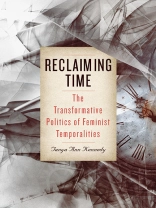The post-2016 election era in the United States is commonly presumed to be an era of crisis.
Reclaiming Time argues that the narratives used to make this crisis a meaningful national story (e.g.,
Hillbilly Elegy,
Strangers in Their Own Land) are not only gendered and racialized but also give a thin account of time, one so superficial as to make the future unimaginable. Examining the work of feminist theorists, performance artists, writers, and activists—from Octavia Butler and Jesmyn Ward to the Combahee River Collective and Congresswoman Maxine Waters—Tanya Ann Kennedy shows how their work disturbs dominant temporal frames; rearticulates the relations between past, present, and future; and offers models for ‘doing’ the future as reparation.
Reclaiming Time thus builds on while also critiquing feminist literary critical practices of reparative reading. Kennedy further aligns the method of reparative reading with the theories and aims of reparative justice, making the case for more fully engaging with social movement activism.
Tabela de Conteúdo
List of Illustrations
Acknowledgments
Introduction
Part I: Crisis and Reparation
1. What Time Is It? Mourning America
2. Precarity and the Girl-Time Imaginary
Interlude: Temporal Reorientations
3. Black Feminism and the Reparative
Part II: Feminism in Reparative Time
4. Chronic Harm: The Anti-Archive and Reparative Time
5. From Combahee Resistance to the Confederate: Black Feminist Temporalities and White Supremacy
Conclusion
Notes
Works Cited
Index
Sobre o autor
Tanya Ann Kennedy is Professor of Women’s and Gender Studies at the University of Maine at Augusta. She is the author of
Historicizing Post-Discourses: Postfeminism and Postracialism in United States Culture, also published by SUNY Press.












